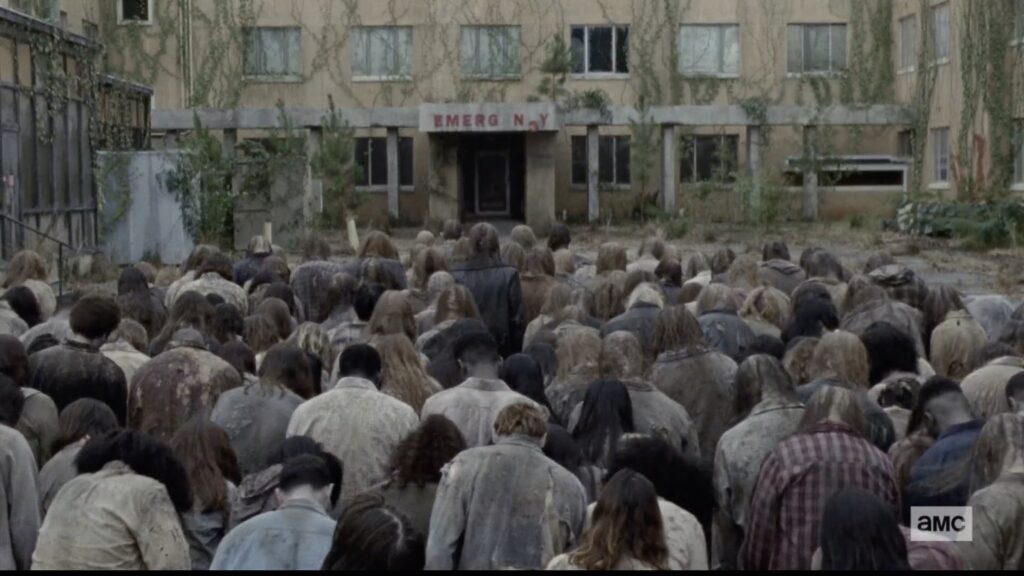A television station Executive Producer candidate literally started to cry during a recent phone interview to discuss local news management opportunities. Yes, really. Perhaps for the first time during my decades-long career, I made a candidate cry. A diverse, very intelligent, and extremely good at what she does up-and-coming candidate at that. Perhaps some of you more experienced local news hiring manager leaders may think to yourself “well, she is not cut out for this business then.” I am here to tell you, she actually is. Or, was. And I am also here to tell you our media industry will lose her, amongst a Walking Dead-like horde of other talented media professionals, to another industry and/or media vertical very soon. In the end, I advised this candidate to do what is best for her. I mean, this was really all I could do/say, right? She is done. Poof. Gone.
Why did this potential candidate start crying? A few reasons, actually. She wanted to advance her career to either a larger market as an Executive Producer or perhaps a smaller market Assistant News Director. Those of you in the industry know the advancement game and the chess moves it typically takes to receive a promotion. And she started to cry because for the first time while talking to me, she realized she simply could not bring herself to do it anymore. She could not be expected to relocate away from friends, family, and her comfort zone into perhaps a less diverse smaller market culture for a moderate (if any) pay increase. While signing a long-term contract. While signing a non-compete which would more than likely cause her to relocate again within two to three years. For less vacation. With perhaps a strained work/life balance. Why else? Over her past three weeks, she was required to work three different shifts to cover missing Executive Producers and/or Producers in an attempt to keep a news product on air.
She barely knew if it was day or night. And she was also tasked to work with less experienced (if not completely new) reporters who typically needed much guidance as they learn the craft. Parts of the craft they were perhaps not taught in college. And, as the turnstile spins with Producers/Executive Producers leaving jobs well before the end of their contract, some of these less experienced professionals are now landing in stations and markets which would have been unheard of even fairly recently. Sound familiar? Perhaps your television station is dealing with similar situations. This realization literally hit her in the jaw while speaking with me. It was painful to hear and should be eye-opening to you, our industry.

My epiphany moment? I recently posted a Director of Digital Sales opening for a programmatic/OTT/CTV provider client in the $300K all-in range and working remotely. I posted to LinkedIn and across every social media platform I inhabit (50K+ connections in media). I hit “send” and my phone/tablet/laptop/email/text/social media bells and whistles went bananas. If only I had this response for Chief Engineer or Executive Producer posts. The sheer volume of senior-level linear/legacy television advertising sales management professionals from both the corporate and local television station levels who reached out looking to leap into this digital space was eye-opening, somewhat overwhelming, and honestly quite telling. I turned away dozens of great candidates, many of whom I have great relationships with. I literally inundated my client with 15-20 pick-of-the-litter top-performing candidates for them to cherry-pick. This rarely happens. And this occurrence may sway/force my company to adapt to the changing times as well. Scary thought, huh?
My craft is perhaps the “canary in the coal mine” within local broadcast. Think about it. Recruiting is all I do. Actually, it is more than that. I speak with hundreds (okay, thousands) of media professionals and make it all about them. Imagine that! And I ask them the strikingly simple question some television station managers sometimes simply fail to ask their own currently employed, captive audience, and top-performing employees: “what’s next” for your career? Title. Location. And, compensation. My God, think about it. Effective, much less ANY, succession planning is perhaps non-existent in today’s broadcast groups. In addition and shockingly, some broadcast groups do not have a robust (if any) centralized corporate human resources recruiting function. Wow. Let that sink in for a bit. A large, perhaps publicly traded, broadcast group without trained media professional recruiting hunters on staff? Trained hunters who could assist already stressed local television stations with a large workload it places on the News Directors and hiring managers. Managers who are now NOT focused on the strategic plan, but tied up in interviews with people they will most likely never be able to afford or are grossly underqualified. But, they are perhaps desperate for a body by end of Q3 or it won’t be filled until next Q2. Sound familiar?
But, I digress. With my candidates, I then try to get them to their next perfect opportunity in a non-aggressive, consultative way with great media industry clients who value recruiting and hiring top talent. And I am here to tell you, the “canary” is dizzy from the carbon monoxide today. The number of local broadcast candidates who respond to my outreach by saying “I am getting out of the business” is at an alarming rate today. More so than at any other time during my media recruiting career. I would place the percentage of people looking to blindly leap from our industry today at roughly 20% of responses. Are we “weeding out” the bad or pushing great employees out of the business? I see the tilt to the latter today. The former was perhaps, but not always, taken care of by the downsizings. So yes, the phrase “the great resignation” is real, and seems to be gaining momentum.

Why is this happening?
- Pay.
- Pay.
- And, pay.
- Ability to work remotely.
- Acquisition fatigue.
- More acquisition fatigue.
- Better work hours.
- Better work/life balance.
- Better benefits.
- Less stress.
- Fleeing a negative news cycle (pandemic, political, etc.).
- No longer wanting to be forced to cover other shifts due to inability to fill positions.
- A news workflow design which could be improved.
- No longer wanting to work with less experienced MMJ’s, Producers, etc.
- Downsizing (see acquisition fatigue).
- Cutting back local sports reporting, a space many enjoyed covering.
- Cutting the cord. Let’s face fact: Local television is still cool…but perhaps not as cool as it once was to this immediate gratification younger generation.
- Throw in a global pandemic.
- MUCH less tolerance to relocate wherever and whenever it takes to advance a typical local television broadcast career (see global pandemic, etc.).
- Non-competes.
- Contracts.

So where is this horde going? Public relations jobs. Communication Specialist jobs. Local Colleges/Universities. Non-profits. Local city/government. Media relations. Anywhere else, honestly. Pureplay digital/OTT/CTV streaming companies. Big Tech companies. Some are more than doubling their current salaries. Many are able to work remotely with reasonable work shifts. Some offer unlimited PTO and other interesting perks to lure applicants. It is uber-competitive. Local broadcast is slow to react to this reality today and is quickly becoming uber-uncompetitive. The “we are local television, people will come” mentality is fading, if not gone, from the mindset of the younger generation who mainly consume streaming products today.
This begs the question: Is this current situation cyclical, or is the industry in a terminal slow death spiral to possible extinction one day? If you ask a television station General Manager or Department Head this question today, many might shrug and say “maybe cyclical?” If you ask a broadcast executive, perhaps they will say “we are fine, it will bounce back.” Has anyone tried to hire a Broadcast Engineer lately? I promise you, there is not an influx of younger generation talent knocking on your television station doors applying to those job postings. Your Engineers have mainly 20-30+ years of experience (I saw a 60-year experience Chief Engineer the other day on LinkedIn…amazing) or brand new (if your stations can somehow find those folks). There are not a lot of up-and-coming Broadcast Engineering professionals in your silos today. These professionals now command top dollar and are going where the money is. News Producer recruiting is as challenging today as I have ever experienced. And this challenge is now trickling up to the Executive Producer level and beyond. Staffing your advertising sales teams is challenging as well. Account Executives are simply not as likely to relocate as in the past and are handcuffed by non-competes. And many of them are not motivated to go into a management role as a Local Sales Manager and accept less money than they make as an individual contributor. I have a client today with a Local Sales Manager opening in a top one-hundred market offering an $80K base salary and $100K all-in at goal. Many 3-5+ year experience Account Executives are currently making more than double this amount. It is simply startling in some stations and markets.
I believe there is another phenomenon occurring today. In some cases, station management is holding onto poor-performing employees because these folks are better than no folks in the seat. Yes, this is happening. Put someone on a performance improvement plan, manage them out, and perhaps have an empty seat for months where the team has to pick up the slack? Or keep the problem in the seat and get something/anything out of them? Station management is asking these very questions today. And there are serious ramifications on your product and on your station culture as a result.
The global pandemic is accelerating the recruiting crunch. We are literally feeling our way through this situation collectively in real-time. While dealing with a bitterly divided country. Local television and journalism, in general, have been accused by some of being biased. “Fake news.” Hotly divided across political lines. Your employees have been yelled at, spit on, cursed at, social media blasted, and even physically threatened, if not worse. And effective journalism is so important today. Where is local television on the bell-shaped curve of where newsprint properties were 10-15+ or so years ago? Perhaps yet to be seen. Broadcast groups and local television stations must continue to adapt. And soon.

Is this all doom and gloom? No. I believe in our industry and its ability to adapt. And, I absolutely love it. But it is changing. Fairly quickly. And probably more quickly than some executives realize. Especially in less desirable to live and/or smaller markets. However, this recruiting challenge is even starting to creep into your Tampa, Austin, Dallas, Orlando, Charlotte, San Diego, etc. markets who typically never had a challenge with recruiting.
Let’s face it though, local television does not always choose to evolve/adapt until it is absolutely forced to do so. Or until just one broadcast group is bold enough to execute what may be viewed as a drastic change. And I truly believe we are inching very near to this line, if not toeing it and leaning over a bit today. I think it will take just one station within one broadcast group to fail to put a newscast on air for just one shift for this warning bell to become a harsh reality for broadcast executives. And I think this day is coming soon…I have been told it has been close with a few stations already. And I believe it will take just one broadcast group to realize they need to pay many (if not all) of their station-level professionals more money and/or offer a more reasonable work schedule, perks/benefits, etc. to level the playing field with the industries currently pulling your people away. To be frank, your industry is losing some of your best and brightest today. Let me repeat: Your industry is losing some of your best and brightest today. Let that sink in. It is happening. And it is happening often. Will the industry be sustainable as a result? TBD. You are honestly at a DEFCON 2 level today. Immediate change needs to be considered and executed. And quickly. And with the input of station-level professionals.
The newsroom workflow design must be modified. Broadcast groups must start paying competitive wages, perhaps even overly competitive wages, to keep their folks. I lost two deals last week alone due to television station management making “swing-for-the-fences” counteroffers. This might be a new reality. And then, as a result, you will have to pay your other employees more money to be fair. These were crazy counteroffers to their employee who just gave their two-week notice to go to my new destination with my clients in order to keep their person. This had not happened to me in the two-year history of my media search firm, and it happened twice in one day. Ouch. However, to those candidates last week, you are welcome. I made you a lot of money and cannot blame you, but will never try to place you again. In the words of Shark Tank’s Mr. Wonderful, you are dead to me.
In my opinion, non-competes and contracts should be unilaterally dissolved and never used by any broadcast group ever again. Wow, yes I said it. For many reasons. These policies and documents were perhaps implemented on a simple premise of corporate distrust with employees and could be viewed as counterproductive to effective, positive employee culture. Think about it. You are forcing folks out of the industry by signing these documents. Sign a 3-year contract? Nope, no thanks. Goodbye. I am under a non-compete and must relocate to continue in this industry? Nope, no thanks. Goodbye. In hordes today. Are broadcast groups and/or television stations consistently enforcing these executed agreements? Non-competes have been deemed unenforceable in some states and are likely to become obsolete across the country due to government intervention anyway. The juice is not worth the squeeze here. Every broadcast group and media industry CEO should jump on a conference Zoom/call to each other and consider implementing a unilateral ceasefire. And soon. Yes, you might lose some employees. Yes, you might lose a client or two. But you can actually gain others without driving your employees out of your industry. And you must implement a corporate culture of trust and positivity and pay your folks market value incomes. Period.

Broadcast groups, many of you have cut to the quick. And some of you have conglomerated into mega-group status to effectively build your empires. Congrats? Now it is time to make tough decisions to consider swinging the pendulum in the other direction, your employees, or suffer the consequences which are occurring today with at least some of your stations. More will come. You must adapt to perhaps survive. You must make top industry professionals and incoming college graduates want to work for you. You must consider not holding a portion of your employee population captive with perhaps outdated management philosophies of contracts and non-competes which do not work on the younger generation workforce. And you should consider not offering salaries, at least in some cases, with the “pffft…someone will take it” mentality. I have an Executive Producer position with a smaller market Midwestern client open for well over six months. We have spoken to dozens of candidates for them. And we are simply unable to find anyone within their budgeted pay range. And this is all we do. It is happening as I type. I have another station client with multiple openings who is without a News Director and has a brand new Assistant News Director in charge of their recruiting efforts while trying to keep a product on air. There are simply not enough fingers and toes to plug the leaks in this situation. And not even my firm can find people to work here. The television station stress level must be released…and soon. At all levels. Because trust me, some newsrooms are at a breaking point. I hear it every single day. Do you think the Producers and Executive Producers have it rough? Those in charge of leading your newsrooms, who try to keep a smile on their faces while being Polly/Paul Positive while weathering this recruiting storm and keeping some semblance of a newscast on-air in some of your smaller markets are at, or near, their breaking point today.
I realize this article is direct. It was meant to be. And I hope it is viewed/digested/discussed in the spirit in which it is intended: As a real-world look into some of the challenges local television is experiencing today across some markets and some stations. Is this my Jerry Maguire-like “manifesto” moment? I am not saying this to slam our industry. Again, an industry I love and make a living staffing. It needed to be said. I am not the first to say it. I will not be the last. And it is reaching a crescendo. Address this today, local television broadcast executives. And quickly. From, the canary.

Ty Carver has over 30+ years of recruiting, HR management, sales, and leadership experience…including the last 10 specific to the broadcast media industry. He is the Founder/CEO of Carver Talent, a local broadcast media management recruiting firm. As the former Director of Recruiting for Raycom Media, he has deep industry relationships. Have a media corporate executive/management or television station management recruiting need? Contact [email protected] for more information.

